March/April 2022
Dear Friends,
We hope this publication of the Fellow’s flyer finds you and your family doing well. April marks an exciting and long-awaited milestone in our program. For the first time since March of 2020, Princeton in Africa fellowships have been permitted to safely and responsibly transition back on-site. The PiAf staff and board members are proud of this accomplishment and anticipate the continued success of the Princeton in Africa program. We could not have achieved this, nor thrived through difficult times during the COVID-19 pandemic without the support of our network, donors, and alumni.
On April 19th, our 2021-22 Fellow, Nduulwa Kowa (Emerging Public Leaders, Ghana), conducted the first on-site Instagram Takeover since 2020. For the next couple of months, many of our Fellows will be posting about their lives while they work and live on the continent. We also have a lot of content coming soon, including highlights from Princeton Reunions in May, the 2022-23 in-person Orientation in June, and our Retreat in Kigali, Rwanda in late June. Follow the journey on the Princeton in Africa Instagram.
In this edition of our Fellows Flyer, we feature articles from three of our Fellows- Kamila Radjabova, Janhavi Apte, and Gaurav Pande. Plus, we share a special announcement of our program’s transition back to the continent.
We want to extend a warm thank you to all the alumni, donors, and friends who offer continuous support to our Fellows and host organization partners.
Warm regards,
Damilola and The PiAf team
PiAf Connections
Please click below to check out pictures of our Fellows, Alums and other members of the PiAf family meeting up at home and around Africa.
Notes from the Field
By Gaurav Pande, '21-'22 Fellow with eleQtra in Uganda

Working remotely out of a cafe in the middle of a trek in Pokhara.
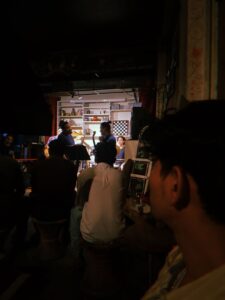
Enjoying live jazz music every Wednesday evening.
Hello reader, I am Gaurav and I want to share with you how my 6 months of remote PiAf fellowship have been immensely and unexpectedly transformative, both professionally and personally. I say “unexpectedly” because I was initially disheartened given the remote element of my work and my doubts about how much meaning I could make out of this experience working in front of a screen from a continent away.
I have grown a lot through my work – growth that I primarily attribute to the independence and agency that I have been entrusted with to lead my own projects. I work with eleQtra, an organization based in Uganda that develops large-scale energy infrastructure projects across Sub-Saharan Africa. “Gaurav, we are interested in doing [enter new project here], could you take a deep dive into it and get back to us next week?” has been a general template of my task assignments; the open-endedness and the huge breadth of such an ask are precisely what has forced me to learn how to craft a project development plan from scratch, design my research, effectively amass valuable insights from my colleagues, and generate something tangible from something very abstract. Examples of these tasks include developing a financial mechanism to incentivize private investments in adaptation projects, developing a business case for our patented technology, researching the viability of a blockchain mining operation within one of our energy projects, etc. Some projects are going strongly whereas some have died off – nevertheless, I have honed in on numerous skills like financial modeling, business development, research, presentation, communication, and learned a lot about myself – my strengths, weakness, and work preferences – through every single one of these exercises.
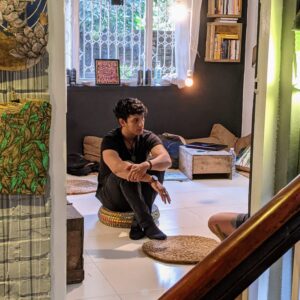
Chatting with artists in residential programs at a local art space in Kathmandu.
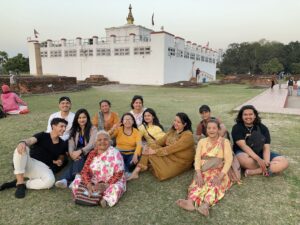
Visiting Lumbini, the birthplace of Gautam Buddha, with my family.
Every day I talk to 12 tiny boxes with names on my Teams screen for eleQtra’s daily catch-up calls. Without even seeing anybody’s face, learning everyone’s quirks, styles, preferences, and personalities just based on their voices, their work contributions, and small talks during little pockets of time in between calls, has felt uniquely intimate, a kind of relationship-building that I have never experienced before. The friendship, kindness, and mentorship that my colleagues have shown towards me is something I am immensely grateful for.
Coming back and living in my country, Nepal, after 4 years of college abroad has been truly life-changing and the biggest silver lining of the PiAf fellowship going virtual. I have always had a shaky relationship with my national identity and home. For the last 6 months, the flexibility of remote work has allowed me to travel across the country, be in nature, engage with the local culture, and deeply learn about my nation’s history, art, and people. The process of redefining my relationship with Nepal has been beautiful and has given me a new sense of groundedness – a shift that has begun to strongly reflect in the music I am making, in the new relationships that I am forming here, and in the photography that I am practicing outside of my work commitments. I look forward to the remaining 6 months of my fellowship and am excited to grow more professionally and personally while I work with my incredible colleagues. Thank you for reading.
Notes from the Field
By Janhavi Apte, '21-'22 Fellow with International Rescue Committee in Kenya
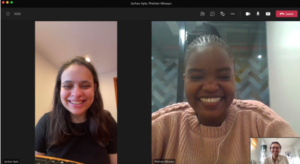
All smiles when catching up with colleagues!
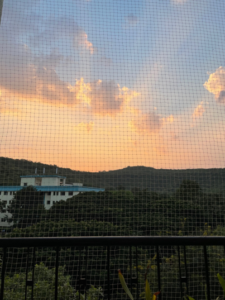
A beautiful sunset in Pune, India
Hello everyone, greetings from Nairobi! My name is Janhavi Apte, and I am a Grants and Reporting fellow with the International Rescue Committee’s (IRC) Kenya country program. It’s hard to believe that I have only three months left of this amazing opportunity, but I feel so fortunate to be able to spend this time in Kenya (after nine months of working remotely) with my wonderful colleagues and co-fellows!
A little about my role: As a Grants and Reporting Fellow, I lead reporting for our programs in Kakuma Refugee Camp, as well as for our urban projects in Nairobi. My job includes creating and disseminating templates based on donor guidelines, preparing timelines, and coordinating technical and HQ reviews of financial and narrative reports before final submission. I also work with the field teams to conduct regular reviews of our grants through Project Cycle Meetings (PCMs) and Budget vs Actual (BvA) meetings.
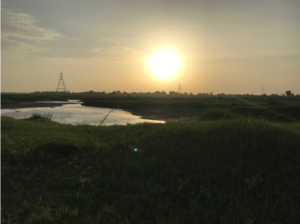
Perks of remote work: I can set up an office anywhere! This is on the banks of the Narmada River in Gujarat, India.
Having never worked in grants management before, I would be lying if I said that I was not nervous about my role in the initial stages of my fellowship. Working in a new sector and doing so virtually from a thousand miles away was intimidating, but my team’s unwavering support throughout my time here has always encouraged me to keep learning, not be afraid of making mistakes, and take on more responsibilities. Being in India with a minimal time difference from Kenya was a true blessing because it meant that I was able to engage with my colleagues in real-time and build meaningful relationships with them, while also getting a chance to be more involved in various aspects of award management.
As such, since starting in June last year, outside of reporting, I have worked on proposal development and partnership management, liaised, and negotiated with donors on grant modalities, and supported Kenya’s Refugee Working Group (with IRC and other INGO members) in their secretariat tasks. It has been a wonderful learning experience so far, and I hope to continue doing so in these final months of my fellowship!
Notes from the Field
By Kamila Radjabova, '21-'22 Fellow with Baylor International Pediatric AIDS Initiative in Botswana

Me and my supervisor, Mr. Katse, during a work meeting
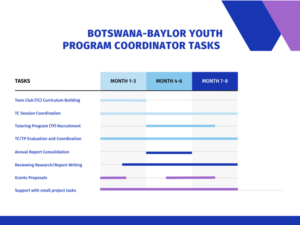
My tasks for the past 8 months at Botswana-Baylor
I am a firm believer that challenges make you discover things about yourself that you never really knew. On a broader scale, challenges can impact cultures, communities, societies, and the global world–as we have intimately witnessed with the Covid-19 pandemic. Covid-19 has revealed the most vulnerable aspects of our society, while simultaneously showing a collective, globalized resilience to overcoming the spread of the infection and returning to a “normal” life. The reality of the situation, however, is that “normal” is never going to be the same again. It is important to be adaptable and grow in the presence of any circumstance, called the growth mindset.
In these past 8 months, Covid-19 has woven into the ways that I have grown professionally and personally this year. My learning and engagement have happened through a virtual platform, and despite this challenge, I have gained a mature and open-minded mindset in working with cultures different from my own, while engaging sustainably and responsibly. I have been intentional about listening to the needs of the teens and volunteers at the clinic to better coordinate teen club and tutoring events that they will find meaningful. I learned that the best way to approach my fellowship position is to think of sustainable ways to create programs that will continue to exist when I leave these spaces.
Which brings me to another big takeaway: teamwork is what makes the dream work! Growth in communities occurs when people come together to work on a similar goal. In this experience, I have had the opportunity to collaborate with physicians, clinical psychologists, social workers, researchers, community health workers, and key global stakeholders at Botswana-Baylor. I have learned that impactful research, treatment, and outreach are achieved through collaboration and working with people from a variety of specialties and backgrounds.
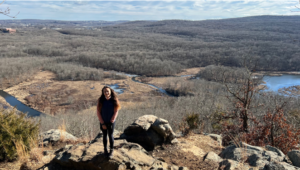
A weekend backpacking trip at Allamuchy Mountain State Park in New Jersey
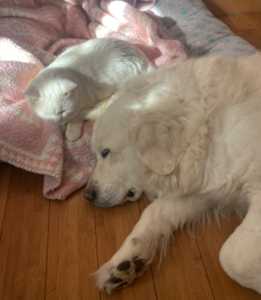
Apollo and Lea taking a nap
My current position requires me to be self-motivating, driven, organized, and growth-oriented. A few key projects I have worked on include: transitioning the teen club curriculum to a virtual setting, consolidation of the organization’s annual report, volunteer training for facilitation and tutoring skills, expanding the tutoring program to the pediatric hematology and oncology wards (previously only offered to HIV positive patients), and submitting 5 grant proposals.
The virtual workspace has also blurred the work-life boundary. Navigating through this new experience has taught me important skills in balancing out my day and allowing room for both my professional growth and personal time. Outside the fellowship, I enjoy spending time with Apollo and Lea (my dog and cat), taking backpacking trips on the weekends, going to museums, and volunteering for a local hospital.
Princeton in Africa has had a lasting impact on the ways that I perceive myself in this world and has shaped me to be a more mindful person. The challenges and blessings that I encountered in this new “normal” have helped me realize the power of the growth mindset and I intend to take this lesson with me to aspects of my life beyond the fellowship.
Notes from the Field
Princeton in Africa Returns to the African Continent

Dear Friends of Princeton in Africa,
At the start of the pandemic, we faced unprecedented challenges and made hard decisions for the well-being of each other and our organization. As we navigated the spread of COVID-19, we developed new plans and strategies for our Fellows to continue supporting our Host Organizations remotely through their fellowships. The importance of our work as an organization is evident now, more than ever- We are committed to making significant contributions to Africa’s well-being, cultivating meaningful relationships with communities in Africa, and with one another.
After more than two years of the Princeton in Africa Staff and Board actively evaluating medical, security, programmatic, logistical, and administrative criteria for restarting our programs in person on the African continent, We are happy to share that in April 2022, our Fellowships resumed on the African continent on a rolling basis until all host countries are approved for a safe transition.
First, we have our resilient Fellows to thank, who were at the forefront of confronting the critical challenges of our time, combating their fears, and building meaningful relationships. We are grateful for the incredible dedication and flexibility of our partners and Host Organizations who worked with us through the pandemic to reimagine international programs and meaningful work that contributes to their important mission on the continent. Lastly, we are grateful to our generous donors and our dedicated staff, board members, and partners around the world, who made this impact possible.
This year, due to the mid-year transition and the remote retreat held in March 2022, PiAf will be hosting an in-continent retreat in late June for our 2020-2021 and 2021-2022 Fellows. During the Retreat, Fellows and Alumni will converge in Rwanda to discuss the lessons they’ve learned from working with their host organizations, their challenges through their work on the continent, and the opportunities they’ve encountered through their fellowship experiences.
Please stay connected with us as we continue to develop the young leaders of tomorrow as they contribute to some of the most impactful organizations in Africa today.
Sincerely,
Damilola Akinyele






